- Home
- Jeanne DuPrau
The People of Sparks: The Second Book of Ember (Books of Ember) Page 2
The People of Sparks: The Second Book of Ember (Books of Ember) Read online
Page 2
It was on this walk that Mrs. Murdo told Lina and Doon about leaving Ember. The three of them walked together, Mrs. Murdo with Poppy in her arms. Doon’s father walked behind them, leaning forward now and then to hear what Mrs. Murdo was saying.
“I was the one who found your message,” Mrs. Murdo said. “It fell right at my feet. It was the day after the Singing. I was on my way home from the market, feeling sick with worry because you and Poppy had disappeared. Then there was your message.” She paused and looked up at the sky. She was keeping a couple of tears from falling, Lina saw.
Mrs. Murdo composed herself and went on. “I thought it would be best to tell the mayor first. I wasn’t sure I trusted him, but he was the one who could most easily organize the leaving. I showed him your message, and then I waited to hear the city clock ringing out the signal for a meeting.”
Mrs. Murdo paused to catch her breath. They were going uphill, over rough clumps of earth—hard walking for city people, whose feet were accustomed to pavement.
“And was there a meeting?” Lina asked.
“No,” said Mrs. Murdo. She plucked some burs off her skirt and shifted Poppy to her other shoulder. “Mercy,” she said. “It’s terribly hot.” She stood still for a moment, breathing hard.
“So there was no meeting?” Lina prompted.
Mrs. Murdo started walking again. “Nothing happened at all,” she said. “The clock didn’t chime. The guards didn’t come out and start organizing people. Nothing. But the lights kept flickering on and off. It seemed to me there was no time to lose.
“So I went to the Pipeworks and showed your message to Lister Munk. We followed the directions, and we found the rock marked with E right away—because people were there already.”
“But how could they be, if they didn’t have the directions?” Doon said. “Who was it?”
“It was the mayor,” said Mrs. Murdo grimly, “and four of his guards. Looper was there, too, that boy who used to keep company with your friend Lizzie. They had huge, bulging sacks with them, piled up on the edge of the river, and they were loading the sacks into boats. The mayor was shouting at them to work faster.
“Lister yelled, ‘What are you doing?’ but we didn’t need an answer. I could see what they were doing. They were going first. The mayor was making sure that he would get out, along with his friends and his loot, before anyone else.”
Mrs. Murdo stopped talking. She trudged along, wiping sweat from her forehead. She frowned up at the hot, bright sky. Poppy whimpered.
“Let me carry the child for a while, Mrs. Murdo,” said Doon’s father.
“Thank you,” Mrs. Murdo said. She stopped and passed the squirming Poppy to Doon’s father, and they walked on.
Lina waited a minute or so, and then she couldn’t wait any longer. “Well, what happened?” she said.
“It was awful,” Mrs. Murdo said. “Everything happened at once. Two of the guards looked up at us and lost their balance and fell into the water. They grabbed hold of the loaded boats, which made the boats tip and dump their load into the river. The other guards and Looper knelt down and tried to reach them, but they were pulled in, too. In the midst of all this, the mayor jumped onto the one boat that was still upright, but as soon as he hit it, it turned over and he plunged into the river.” Mrs. Murdo shuddered. “He screamed, children. It was a horrible sound. He bobbed in the water like a giant cork, and then he went under. In just a few seconds, he and his guards were swept away. They were gone.”
They walked in silence for a while, going downhill now. After a few minutes Mrs. Murdo went on.
“So Lister and I went back up into the city, and we had the Timekeeper ring the bell for a public meeting. We tried to explain what to do, but as soon as people heard the first bit—that a way out of Ember had been found, and that it was in the Pipeworks—everyone began shouting and rushing around. Things turned into a terrible mess. People were in too much of a hurry even to ask questions. Hundreds of them poured through the streets of the city all at once, and outside the door of the Pipeworks a huge crowd pushed and shoved to get in, so many people, so panicky, that some were trampled and crushed.”
“Oh!” cried Lina. “How horrible!” These were people she knew! It was too awful to think about.
“Horrible indeed,” said Mrs. Murdo. She frowned out across the vast landscape surrounding them, where there were no people in sight at all. “It was impossible to control them,” she went on. “They rushed to the stairway—some people lost their footing and fell all the way down the stairs. Others ran right over them. And then when they realized that they were going to have to get into these little shells and float on the river, some people were so frightened that they turned around and tried to go up the stairs again, and some were so eager to get going that they jumped into the boats and capsized them and fell into the river and were drowned.” She raised her eyes to Lina’s. “I saw everything that happened,” she said. “I’ll never forget it.”
Lina looked behind her at the citizens of Ember toiling across the hills. These were the ones who had made it out. “How many do you think were—left behind?” she asked Mrs. Murdo.
Mrs. Murdo just shook her head. “I don’t know,” she said. “Too many.”
“And have the lights gone out forever now?”
“I don’t know that either. But if they haven’t, they will soon.”
Hot as she was, Lina shuddered. She and Doon exchanged a look. They were thinking the same thing, she was sure: their city was lost in darkness now, and anyone left there was lost, too.
Later that day the refugees from Ember came to the road they had seen from afar. It was potholed and weed-cracked, but easier to walk on than the rough ground. It led alongside a creek that flowed swiftly over round, smooth rocks. In all directions, they saw nothing but endless expanses of grass. They shared the food they had brought with them, but it wasn’t much. Some of them soon grew weak with hunger. They grew faint from the heat, too, which was hard to bear for people used to the constant chill of Ember. Poppy cried when she was set down on her feet, and her face looked flushed and hot.
Night came in the strange, gradual way so different from the sudden lights-out that signaled night in Ember. The travelers lay down on the ground and slept. They walked the next day, too, and the day after that. By then the food they had brought with them was gone. They traveled more and more slowly, stopping often to rest. Poppy was listless; her eyes were dull.
Finally, around the middle of the following day, they trudged up still another hill, and from there they saw a sight that made many of them weep with relief. Farmed fields lay below them in a wide valley, and beyond the fields, where the stream they’d been following joined a river, was a cluster of low brown buildings. It was a place where people lived.
Like the others, Lina was glad to see it. But it wasn’t a bit like the city she had imagined, the one she’d drawn pictures of back in Ember, the one she’d hoped to find in this new world. The buildings of that city had been tall and majestic and sparkling with light. That city must be somewhere else, she thought as she started down the hill. She’d find it—not today, but someday.
CHAPTER 3
Through the Village
The woman who had greeted them led the people of Ember into the town. They went down a dusty street, past buildings that looked as if they’d been made out of the same brown earth that was underfoot. They were heavy-looking, imperfect buildings: their walls were fat and lumpy, rounded smooth at the corners. Lina saw cracks in the walls and crumbled places where bits of a window ledge or a step had fallen away.
Paths and alleys and strips of garden wound between the houses. It was clear that no one had planned this place, not the way the Builders had planned Ember. This town must have grown, one bit added to the next and another bit added to that. Plants grew everywhere. In Ember, the only plants were in the greenhouses—unless you counted mold and fungus, which grew on the trash heaps and sometimes in kitchens and bathrooms.
Here, flowers and vegetables grew together beside every house. Plants sprang up alongside the streets, climbed walls, crawled over fences, pushed up through cracks in stairways, tumbled out of big pots and over windowsills and even down from roofs.
There were animals, too—huge, amazing, terrifying animals. In a fenced-in place at the edge of the town, Lina saw four brown animals much bigger than she was, with squarish heads and long, tasseled tails. Farther on, tethered to a post in front of a house, was a yellow-eyed creature with two spikes poking out of its head. When she walked by, it suddenly said, “Ma-a-a-a,” and she skittered away in fright.
She turned to look for Doon, who had fallen a little behind. She found him stooping over, peering at some yellow flowers growing next to a wall. “Look at this,” he said when she came up beside him. He pointed to a flower’s tube-shaped center. “There’s a spider in there the exact same yellow as the flower.”
There was. Only Doon would notice such a thing. Tugging at the sleeve of his jacket, she said, “Come on. Stay with us,” and she hurried him up toward the front of the line to join his father and Mrs. Murdo and Poppy.
These four people—Poppy and Mrs. Murdo, Doon and his father—were Lina’s family now, and she wanted them close around her. Only Poppy was really related to her. But Mrs. Murdo was like a mother; she had taken Lina and Poppy into her house when their granny died, and she would have kept them with her if they hadn’t had to leave the city. Doon’s father was part of her family just because he was Doon’s father. And Doon himself—he was the one who’d been Lina’s partner in finding the way out of Ember. There was a tie between the two of them that could never be broken.
On they walked, down one street and up another, around curves and down through narrow passages. Everywhere, people stared at them. Some leaned from open windows. Some sat up on roofs, their legs dangling over the side. Some stood still in the midst of work they’d been doing, their shovels or brooms in their hands. These people were taller and browner than the people of Ember. Were they friendly? Lina couldn’t tell. A few children waved and giggled.
After a while, the refugees came out from the narrow streets into a wide-open area. This must be like Ember’s Harken Square, Lina thought, a place in the center of town where people gather. It wasn’t square, though. It was more like a rough half circle paved in dusty brown brick.
“What is this place called?” Lina asked Mary Waters, who was walking just ahead of her.
“The plaza,” Mary said.
Plah-zuh. Lina had never heard that word before. It was her first new-world word.
On one side of the plaza was the river. On the other side were stalls with thatched roofs and small buildings with display racks out in front holding faded-looking clothes, shoes with thick black soles, candles, brooms, pots of honey and jam, along with plenty of things that Lina didn’t recognize.
A bigger building stood at the plaza’s far end. It had wide steps in front, a double door, and a tower with windows up high that looked out over the plaza. Next to it was a tremendous plant of some kind—a great pole, much higher than the building, with branches like graceful, down-sweeping arms and leaves like bristles.
“What is that?” Lina asked a woman who was standing at the edge of the plaza, watching them go by.
The woman looked startled. “That’s our town hall,” she said.
“No, I mean the big plant next to it.”
“Big plant? The pine tree?”
“Pinetree!” said Lina. “I’ve never seen a pinetree.” Her second word: pinetree.
The woman gave her an odd look. Lina thanked her and walked on.
“Step this way, please,” said Mary, who was trying to keep the unruly refugees in order. “There’s plenty of water for you here—both in the river and in the fountain.” She pointed to the middle of the plaza, where there was a pool of water circled by a low wall. The water in the middle of the pool jumped up into a column of bubble and spray that splashed back down and jumped up again constantly.
The people of Ember surged forward. Dozens ran to the edge of the river and bent down to bathe their faces with water. Dozens more crowded around the pool. Children splashed their hands in it, crawled up on the rim, and tried to reach the leaping water in the middle. Some of the children jumped in and had to be hauled out by their parents. People at the rear of the crowd pushed forward, but people at the front weren’t ready to be pushed. Suddenly there was yelling and jostling and water sloshing out onto the pavement. Lina slipped and fell down, and someone tripped over her and fell, too.
“Please!” shouted Mary, her deep, loud voice rising above the uproar.
“Order! Order!” shouted a man’s voice. Lina heard other voices, too, as she struggled to her feet, the voices of the villagers crowding in at the edges of the plaza.
“Get back, Tommy, get away from them!”
“Where did you say they came from? Under the ground?”
“Are they people like us, Mama?” a child said. “Or some other kind?”
Of course we’re like you, thought Lina. Aren’t we? Are there more kinds of people than one? She got to her feet and wrung out the hem of her sweater, which was sopping wet. She spotted Mrs. Murdo on the other side of the plaza and headed toward her.
The commotion finally subsided. The people of Ember, their thirst quenched, gazed about them in wonder. Everything was strange and fascinating to them. They stood with their heads craned back, gazing at the towering plants and the peeping creatures that flitted around in them; they stooped down to touch the bright flowers; they peered in doorways and windows. Children ran down the grassy bank to the river, tore off their shoes and socks, and dunked their feet in the water. Old people, exhausted from their long walk, lay down behind bushes and went to sleep.
The three town leaders began moving among the people of their village, talking with them in low voices for a minute or two, then nodding and moving on. Lina saw these townspeople glance at the new arrivals with worried looks; they didn’t seem to know what to say. Lina could understand why. What would the mayor of Ember have done, for instance, if four hundred people had suddenly arrived from the Unknown Regions?
By this time, the sky was beginning to darken. A few townspeople started calling the refugees together. “Come this way! Call your children! Please sit down!” They stood at the edges of the crowd with their arms stretched out and nudged people inward, until finally all four hundred people were squeezed into the plaza, gathered around the wide steps in front of the town hall, where the three leaders were standing.
Mary Waters raised her arms above her head and stood that way without speaking for several seconds. She looked powerful, Lina thought, even though she was very short. The way she stood, with her feet planted slightly apart and her back straight, made her seem almost to be growing out of the ground. Her black hair was streaked with gray, but her face was smooth and strong-boned.
Gradually people fell silent and turned their attention to her.
“Greetings!” she cried. “My name is Mary Waters. This is Ben Barlow. . . .” She pointed to one of the men standing next to her, a wiry man with a stiff, gray, box-like beard jutting from his chin. He had two wrinkles, like the number eleven, between his eyebrows. “And this is Wilmer Dent,” she said, pointing to the other man. He was tall and thin, with wispy, rust-colored hair. He smiled a wavering smile and waggled a few fingers in greeting. “We are the three leaders of this village, which is called Sparks. Three hundred and twenty-two people live here. I understand that you come from a city three days’ walk away. I must say, this is a . . . a surprise to us. We have not been aware of any post-Disaster settlements nearby, much less a city.”
“What does ‘post-Disaster’ mean?” Lina whispered to Doon.
“I don’t know,” Doon said.
Mary Waters cleared her throat with a gruff sound and took a breath. “We will do our best for you tonight, and then tomorrow we will talk about . . . about your plans. Some of our househol
ds are willing to take in a few of you for the night—those with young children, and those who are old or ill. The rest of you may sleep here in the plaza. Those who go with the householders will share in their evening meal. Those who stay here will be given bread and fruit.”
There was a scattering of applause from the people of Ember. “Thank you!” several voices cried out. “Thank you so much!”
“What’s ‘bread’?” Lina whispered to Doon.
He shrugged his shoulders.
“Will all those who most need shelter for the night please stand?” Mary Waters called. “As I said—those with children, and the elderly and ill.”
A rustle swept through the crowd as people got to their feet. Voices murmured, “Stand up, Father,” “You go, Willa,” “No, I’m all right, you go,” “Let Arno go, he’s sprained his foot.” Because of Poppy, Lina and Mrs. Murdo stood up. Doon remained sitting, and so did his father.
The brilliant yellow ball in the sky was traveling downward now, and the shadows grew longer. Night was coming, and with the gathering darkness Lina’s spirits grew darker, too. She thought of the green-and-blue bedroom she’d moved into back at Mrs. Murdo’s house in Ember, the lovely room she had been so glad to have. She was homesick for it. Right now, she would have been happy to have a bowl of turnip soup and then crawl between the covers of the bed in that room, with Poppy next to her, and Mrs. Murdo out in the living room tidying up, and the great clock of Ember about to strike nine, the hour when the lights went out. She knew that this place—the village of Sparks—was alive, and that Ember was dead, and she would not want to go back there even if she could. But right now, as the air grew chilly and whispered against her skin, and a strange bed in a stranger’s house waited for her, she longed for what was familiar.

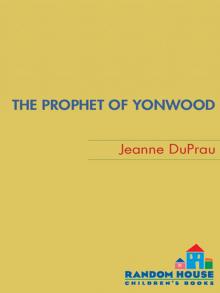 The Prophet of Yonwood
The Prophet of Yonwood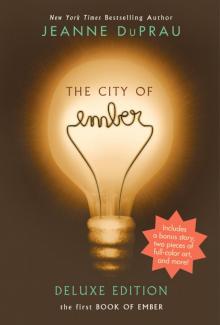 The City of Ember
The City of Ember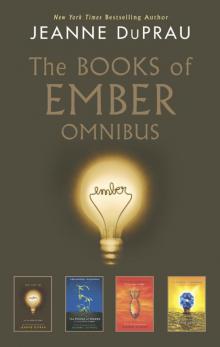 The Books of Ember Omnibus
The Books of Ember Omnibus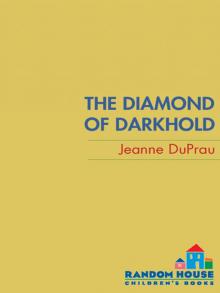 The Diamond of Darkhold
The Diamond of Darkhold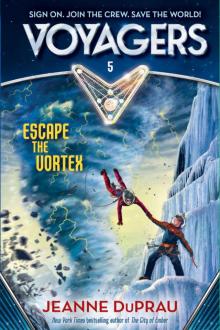 Voyagers: Escape the Vortex (Book 5)
Voyagers: Escape the Vortex (Book 5)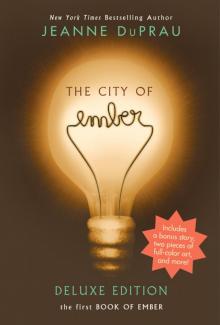 The City of Ember Deluxe Edition
The City of Ember Deluxe Edition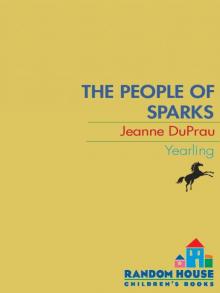 The People of Sparks: The Second Book of Ember (Books of Ember)
The People of Sparks: The Second Book of Ember (Books of Ember)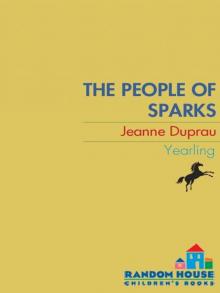 The People of Sparks
The People of Sparks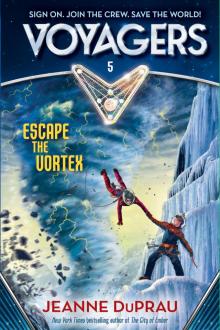 Escape the Vortex
Escape the Vortex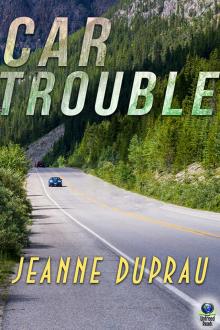 Car Trouble
Car Trouble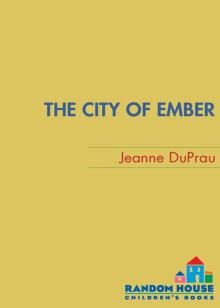 The City of Ember: The First Book of Ember
The City of Ember: The First Book of Ember